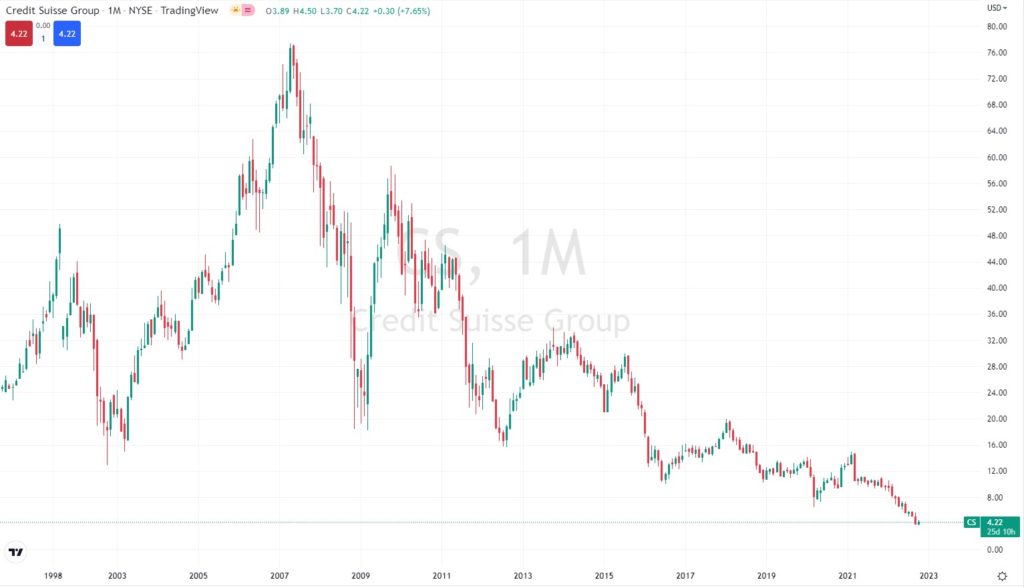Credit Suisse News: Is This European Bank the Next Lehman?
Disclosure: We are reader-supported. If you purchase from a link on our site, we may earn a commission. Learn more
Last Updated on: 11th October 2022, 03:55 pm
Recently Credit Suisse News has been featured in many headlines across the major financial news outlets. What exactly is going on with this major Swiss bank? And what might the future of this bank mean for the financial markets?
A lot of speculation on the financial health of Credit Suisse started appearing on Twitter over the first weekend of October 2022. The bank's share price then tumbled on Monday by 12 percent before recovering and closing above the opening price.
Table of Contents
Credit Suisse News
Investors are worried about the current macroeconomic outlook, rising interest rates, soaring inflation, and a possible recession around the corner. These factors magnify concerns about the large Swiss bank, and how bad the fallout could be.
Some have been suggesting a Lehman Bros. style capitulation for Credit Suisse. Although there is always a possibility of a severe event, it seems unlikely right now. First, we are not at the point we were in 2008.
When a housing bubble burst and securities that were backed by mortgages, and rated AAA, failed sending financial market participants rushing for the exit. Second, Lehman was overexposed to these securities, known as MBS (Mortgage Backed Securities). And they paid a heavy price.
Twitter Storm
On Friday, September 30, Credit Suisse's CEO Ulrich Koerner sent his staff an internal memo advising that it is a critical moment ahead of the restructuring plan that will be unveiled on October 27. And that they should expect extra market volatility.
Instead of reassuring investors, the memo sparked a fire on Twitter, with many tweets speaking of collapse and even involving another German bank Deutsche Bank. Some of these tweets racked up several thousand likes.

Adding to the Twitter storm, is Fox reporter Charles Gasparino, tweeting that a large investor of the bank told him the investment banking division “is a disaster”.
So, it wasn’t surprising that the stock price on the following Monday dropped to its all-time low of $3.70. However, the stock’s price managed to rally back up again and has stabilized at $4.22 at the time of writing.
Restructuring Bad Assets
What happens to Credit Suisse will depend greatly on how they restructure their exposure to risk and failing assets. The investment bank of the firm has had a rough time of late. In the recent past, Credit Suisse has lost $7.2 billion from investments gone sour.
The bank lost $5.5 billion with the collapse of the investment firm Archegos in April 2022. And in the previous year, the bank lost $1.7 billion when Greensill Capital went under. Much is to blame on the bank's risk management team for the shortcomings, however, it has raised questions about the bank's stability overall.
Amid the bad Credit Suisse news, is some assuring evidence of the Bank’s overall financial health. The New York Times reports that the CEO stated in the memo sent on Friday, that the bank holds $100 billion in cash to cover losses. Adding that the bank also holds nearly $238 billion in high-quality assets.
The CEO also affirmed that “Speculating that we have a liquidity issue simply would be completely false,” given the liquidity the bank has set aside to back up any emergency.
Analysts at JP Morgan have valued that Credit Suisse is currently undervalued by about one third at current prices. They also see the best route for the bank is to split off the investment banking arm and stick to wealth management.
Financial Health Gauge
The memo was released on the back of the sharp rise in the cost of credit default swaps. The financial instruments are used by institutions to gain and cover the risk of default from the underlying counterparty.
The more expensive the contract is the higher likelihood of default the market is pricing in to cover the risk. The price of a 5-year credit default swap at the beginning of the year was around 55 basis points. It recently surged to 293 basis points, raising concerns over Credit Suisse’s capabilities to make good on its debt.
Earnings release
As mentioned earlier Credit Suisse is set to release its restructuring plan on October 27. The bank needs to raise more cash, and selling more shares given the current stock market climate seems the most unlikely path.
Other options that the bank is evaluating are job cuts and asset sales of some divisions within the bank. To make things more interesting coming up to October 27, Credit Suisse will also release earnings on that day. Stoking fears of the bank's capacity to pull through are dire earning reports for the past three quarters in a row. From the bank's media releases for the second quarter and for the first quarter of 2022 we can see they have the following losses:
- 4Q 2021 Pre-Tax Income Loss – CHF 1.664 billion
- 1Q 2022 Pre-Tax Income Loss – CHF 428 million
- 2Q 2022 Pre-Tax Income Loss – CHF 1.173 billion
Credit Suisse Stock Price
We can see from the chart that the Credit Suisse stock price has continued to fall after an initial recovery from the financial crisis of 2008. Before the sharp selloff in 2008, the bank’s stock price had reached an all-time high of $77.40.
The stock market crash that evolved after the asset backed securities debacle in 2008 sent the stock price as low as $18.17. After which Credit Suisse shares managed to pull back a recovery. However, that was short-lived and after touching $58.65 in October 2009 the bank has continued in a free fall.

Conclusion
Looking at the risk of default from Switzerland’s second largest bank can be done by looking at the stock price and the credit default price. The stock price is clearly indicating a large amount of risk for the forward projection of profits from this bank.
In general, stocks that are priced under $1.00 are considered close to bankruptcy, and we sure are getting close. On the credit default swap side, a comparison with the price of credit default swaps for Credit Suisse in 2008 would be necessary.
According to one Reddit user, Credit Suisse's 2-year credit default swaps rose to levels above those experienced in 2008. The bank didn't fold then, but then again, the situation was different, and Credit Suisse was probably in a stronger financial position than now.
Would a Credit Suisse bankruptcy spark a major financial market crisis? In my personal opinion, I see that as unlikely. First of all, we are nowhere near the credit and housing market bubble we witnessed back in 2008. Secondly, banks have much more cash on hand to navigate troubled waters.
Wrapping up
We are currently going through major turmoil at geopolitical and macroeconomic levels. Rising inflation is eating away at our wealth and causing the stock market to sink. Precious metals can be an effective way to protect against financial crises.
Despite the war in Ukraine and the negative fallout from its consequences, gold and other precious metals can help diversify returns as gold price is not heavily correlated to stocks. To get the most from your gold investment you take advantage of a tax-free environment within a gold IRA.
Many companies out there offer their expertise and knowledge to get you set up, run, and administrate your gold IRA. We have selected some of the best in the industry, you can read their reviews here.



 Silver
Silver Gold
Gold Platinum
Platinum Palladium
Palladium Bitcoin
Bitcoin Ethereum
Ethereum

 Gold: $4,088.44
Gold: $4,088.44
 Silver: $48.34
Silver: $48.34
 Platinum: $1,575.77
Platinum: $1,575.77
 Palladium: $1,433.57
Palladium: $1,433.57
 Bitcoin: $111,218.80
Bitcoin: $111,218.80
 Ethereum: $3,980.93
Ethereum: $3,980.93